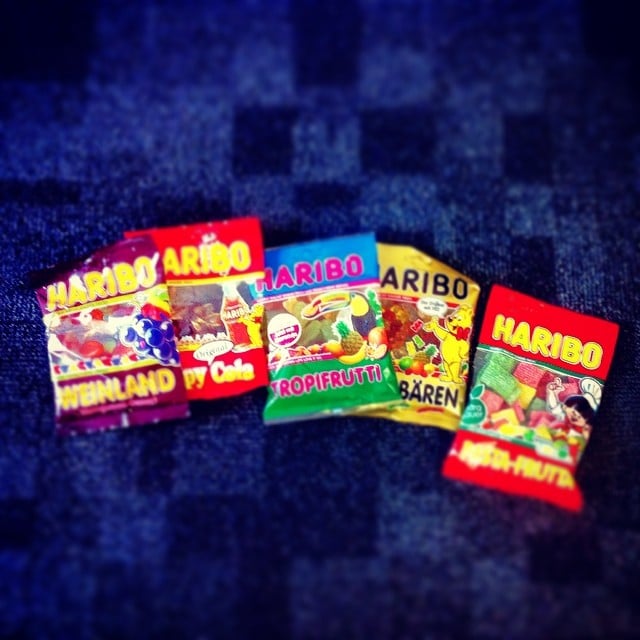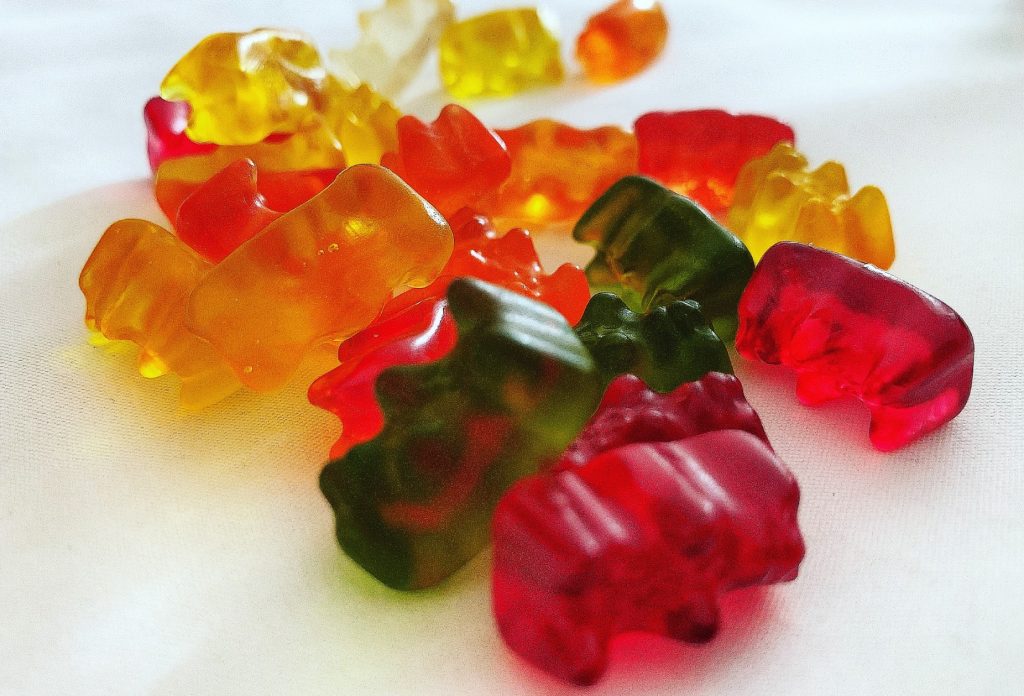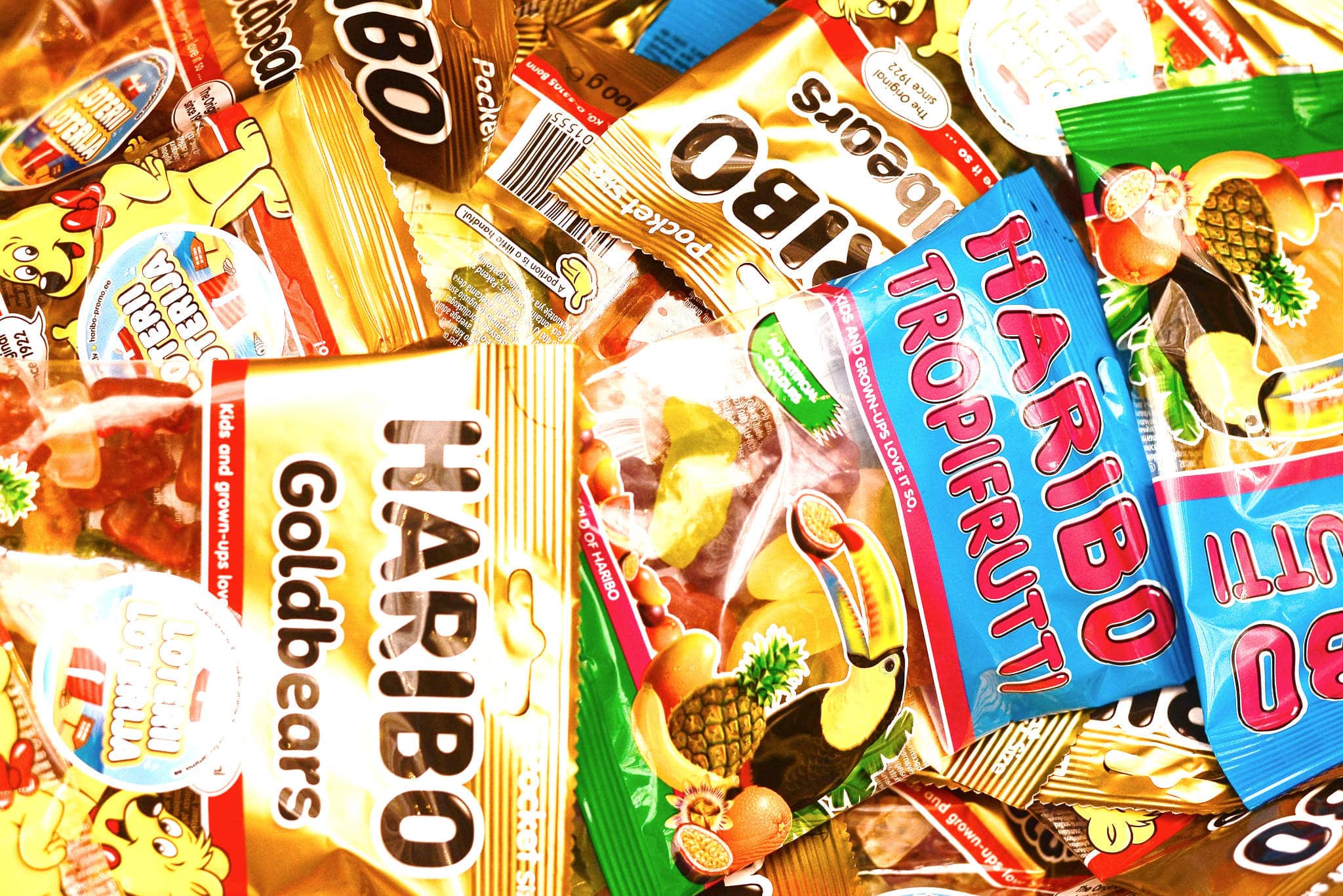Are Haribo Sweets Vegan?
Important Note: When you buy through our links, we may earn a commission. As an Amazon Associate we earn from qualifying purchases. Content, pricing, offers and availability are subject to change at any time - more info.
If you have a sweet tooth and like trying candies or desserts from foreign countries, odds are you’ve heard of Haribo: a German confectionery company most known for its line of delicious gummy bears. But in addition to gummy bears, Haribo also makes other types of candies and sweets for kids and adults alike!
But hold up – before you dive into a package of gummy bears, you need to know whether Haribo’s sweets are vegan or not. Today, let’s break down which, if any, Haribo candies or vegan so you can treat your sweet tooth without compromising your diet.

Non-Vegan Ingredients in Haribo Sweets
Unfortunately, the majority of Haribo candies and sweets are not vegan or vegetarian. That’s because most of their gummy bears and other delectable delights include a few non-vegan ingredients, such as:
- Gelatin, which is a very common nonvegetarian ingredient in chewy sweets like gummy bears. This isn’t a vegetarian or vegan ingredient since it’s a natural protein extracted from animal tissues like tendons, skin, bones, and ligaments. This is doubly unfortunate since there are plenty of synthetic or vegan alternatives to gelatin, but many companies still use gelatin to ensure that their candies have a chewy texture or familiar taste
- Beeswax, which is another non-vegan ingredient since it is produced by bees. Beeswax doesn’t have any animal flesh, so it is suitable for vegetarians. But vegans may try to avoid eating beeswax products since the harvesting of beeswax can disrupt the natural habitat of bees and lead colonies to struggle or die
- Carmine, which is a natural red food dye. Unfortunately, you can only get it by crushing the shells and bodies of certain insects. You can find this red dye also under the name E120. Some companies choose to obtain Carmine from vegetables or fruits like strawberries, but others, including Haribo, use the insect extraction method since it is overall cheaper
- Palm fat or oil, which doesn’t include any animal ingredients. Technically, that makes palm fat or oil vegan. But palm oil and fat are very rarely produced sustainably; many companies use palm oil taken from companies that commit deforestation and that contribute to the extinction of animal species. Fortunately, there’s some evidence to suggest that Haribo’s sweets use palm oil extracted from sustainable methods, but more research needs to be done to confirm this
- Sugar. Most sugar is vegan by definition, but some sugar is not since it may be produced using bone char: an animal byproduct from charred cattle and other bones. If you’re an American buying Haribo candy, try to research where their sugar came from or what manufacturing methods were used
Aside from all of this, many Haribo sweets (if not all of them) are always at risk of cross-contamination within their factories in manufacturing plants. Because of this, lots of Haribo candies could contain traces of animal ingredients like milk or other proteins.
The majority of vegan snow that cross-contamination is almost impossible to eliminate. But others might want to only consume vegan products with no risk of cross-contamination. If that’s the case for you, none of Haribo’s sweets will fully qualify as vegan.

Which Haribo Sweets are Vegan?
So, the majority of Haribo candies are non-vegan, either because they are exposed to cross-contaminated particles or because they use certain ingredients derived from animal products. But there are a few Haribo candies that could qualify as vegan (if you ignore the cross-contamination factor). Let’s take a closer look:
- Rainbow Spaghetti Candy
- Rainbow Strips Zing Candy
- Rainbow Twists (Sour) Candy
- Soft Jelly Bears
That’s it – four choices out of the dozens and dozens of different candy products that Haribo produces. That’s because most of these candies use gelatin and/or beeswax, although a few also include milk in their formulas.
Vegetarians have many more choices from Haribo’s candies, including the regular jellybeans, starfish, strawberry twists, and more.
Still want something sweet? How about some Easy Avocado Chocolate Mousse? You can make it at home, and you don’t have to worry about it breaking your diet. Best of all, you can learn to make this tasty recipe right here!
How to Tell if a Haribo Candy is Vegan
When you’re looking through all of Haribo’s sweets at a store or online, it can be tough to tell at first glance whether a given candy is vegetarian or vegan or not. However, you can usually tell if candy is vegetarian – the package will feature a round green sticker on the front of the package.
Vegans need to look a little closer. Examine the sweets closely and see if they are shiny or glazed. If that’s the case, they are probably glazed with beeswax. On the other hand, if the candies in question are covered in sugar particles, they are probably vegan (provided that the sugar used wasn’t filtered through bone char).
Naturally, you should still look at the back of the candy package and read through all the ingredients to be sure. Still, this visual test is a great way to quickly determine whether a candy is (likely) vegan or not.
So, Are Haribo Candies Good for Vegans?

All in all, Haribo’s sweets are not broadly vegan, although there are a couple of exceptions because they don’t include non-vegan ingredients like beeswax and gelatin. That said, Haribo isn’t attempting to advertise heavily to vegans and does not offer any vegan-specific candies or sweet treats. Furthermore, some of their sugar may be filtered using bone char, which can make many or all of their candies non-vegan by default.
Ultimately, it’s a good idea to do more research before purchasing any Haribo candies if you’re a vegan. You can also check out our other vegan information, recipes, and more on Cook Gem!
























